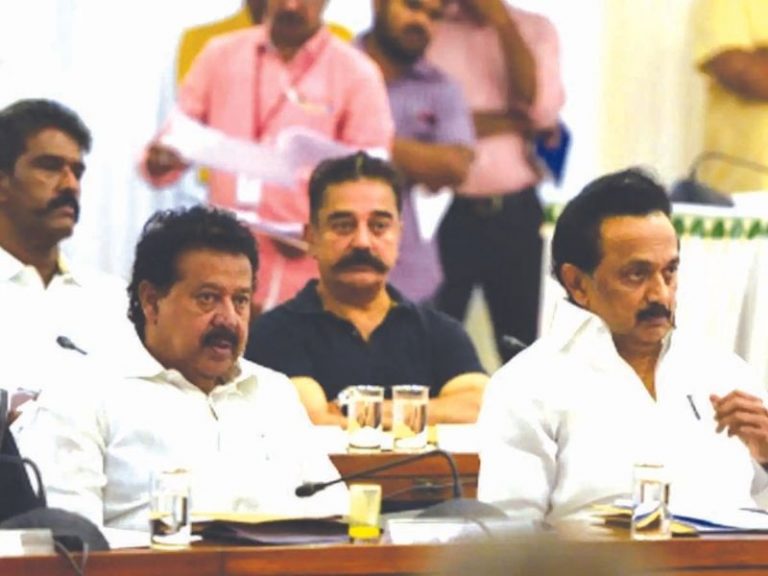Tamil Nadu: Dormant issue backlash
-Shivani Chaturvedi (Chennai)
Swept to power in the legislative assembly election held in April 2021 with a comfortable majority of 159 seats in the 234-member assembly, Tamil Nadu’s Dravida Munnetra Kazhagam (DMK) government has declared war against the National Education Policy (NEP) 2020 approved by the BJP/NDA government at the Centre.
The DMK government finds NEP 2020’s three-language formula, common entrance test for undergraduate courses, and the introduction of a four-year degree programme with options of multiple entry and exits, objectionable. On April 5, the state government constituted a 13-member committee chaired by D. Murugesan, a former chief justice of the Delhi high court to formulate a State Education Policy (SEP) exclusively for Tamil Nadu (pop.68 million).
“The state government will come out with a state education policy within a year. Though education is on the concurrent list (of the Constitution), in practice it is being treated as if it belongs to the Central list. NEP 2020 was prepared without consulting state governments,” said K. Ponmudi, the state’s higher education minister in a statement issued on April 15.
Yet the main reason for Tamil Nadu’s rejection of NEP 2020 is an old issue: the BJP government at the Centre has revived a dormant campaign to impose “Hindi language imperialism” on TN and non-Hindi speaking states of peninsular India. Opposition to Hindi as India’s national language by Tamil Nadu’s entire political class is not new.
It dates back to the 1930s when the founder of the Dravidian movement Periyar E.V. Ramasamy (1879-1973) opposed this proposition mooted by the pre-independence Congress party and leaders of India’s freedom movement.
Although it also boasted stalwarts such as C.R. Rajagopalachari and K. Kamaraj, India’s freedom movement was dominated by Congress party leaders from the subcontinent’s northern states, and Uttar Pradesh — India’s most populous Hindi speaking state — in particular. Moreover, the leadership of the Congress party tended to be overwhelmingly from the upper castes, a phenomenon which was viewed with suspicion by the iconoclastic Periyar Ramasamy. This revered leader of Tamil Nadu’s Dravidian assertion movement was bitterly opposed to domination and oppression of the lower castes by peninsular India’s powerful Brahmin community.
In 1950 when the Constitution of India was approved by Parliament, it contained Article 343 which promulgated Hindi as free India’s national language, although it provided a clause that English would continue to be the lingua franca for all official purposes of the Union for 15 years. In 1965 when this interim period expired and Hindi was declared the national language, riots broke out across south India and the DMK initiated a secessionist movement in Tamil Nadu.
As a result, Parliament accepted English as the associate official language of India. In school education a three language learning formula under which children countrywide would learn Hindi and two other languages, including English, was adopted. But the three languages formula has proved a non-starter with north Indians showing little interest in learning Dravidian languages. Therefore, all post-1965 governments in Tamil Nadu have officially mandated the learning of only two languages — Tamil and English. The reasoning of the Dravidian parties (including the opposition AIADMK) is that if Hindi is accepted as the national language, native Hindi speakers from the northern states will have a natural advantage in bagging government, civil and defence services, and corporate jobs to the disadvantage of non-native Hindi speakers. Therefore, maintaining English as the neutral national language creates a level playing field.
Notwithstanding this history, NEP 2020 confusingly mandates the three-language formula for all school children but says “no language will be imposed on any state,” and “wherever possible, the medium of instruction until at least grade V, but preferably till grade VIII and beyond, will be the home language/mother-tongue/local language/regional language… This will be followed by both public and private schools”. The formulators of NEP 2020 seem unaware that following a prolonged battle in the courts in 2014 the Supreme Court ruled that the choice of medium of instruction is of parents, not government.
On the issue of the state government’s power to frame its own education policy, it can do so under Article 246 List II of Seventh Schedule of the Constitution (aka the concurrent list), says advocate MJ John Arokia Prabhu, vice president of the Tamil Nadu Private Schools Association, who also heads the legal team of the Delhi-based National Independent Schools Alliance (NISA).
“While the state government is entitled to formulate its own State Education Policy, it’s curious that there isn’t a single representative of parents, teachers or students on the 13-member Murugesan Committee which was commissioned to formulate the proposed TN State Education Policy. This is a grave lacuna,” says Prabhu.

















Add comment